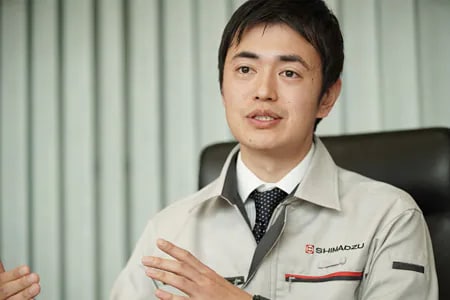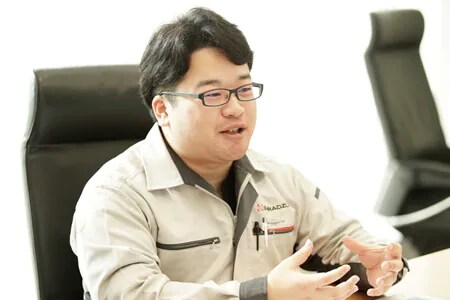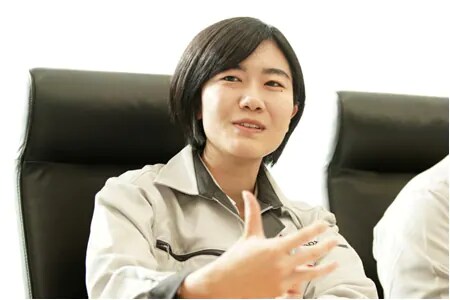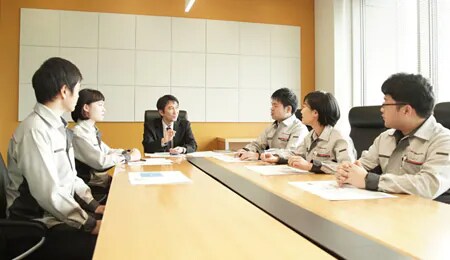Celebrating 50 Years of MS Innovation - The Future of MS: Technical Discussions
We asked several Shimadzu engineers to discuss their ideas and hopes for the future of MS technology.

MS as an everyday, household device

Hoshi : At the moment, mass spectrometers are considered cutting-edge technology, and only people with specialist knowledge can use them. If we’re talking about more ambitious aims, I’d like to make an MS instrument into an everyday device that anyone can use, like a weighing scale or a thermometer. For example, when someone’s taking a health check, there would be an MS behind the nurse, and the nurse could place a vial of blood directly into the MS and immediately get a result. Or perhaps MS devices would even be at the supermarket or in our homes, and we could measure the freshness of foods with the same ease as placing them on a balance to weigh them. So my dream for the future of MS would be to get rid of the conscious awareness of using complicated technology.
Chu :People around the world are becoming more health-conscious, so there will be more demand for simple devices that allow people to monitor their own health and the safety of their own food. It would be very convenient to have a household MS system.
Hoshi : Another thing is, you often hear about incidents where drivers fall asleep behind the wheel of buses and trains and so on. But if you could measure the driver’s sweat, or breath, or saliva using an MS, perhaps you could immediately check their condition and prevent accidents.
Imoto : So you’re thinking of measuring sweat or saliva samples in real time, on site.
Sakashita : If you’re using MS, you could get more precise and comprehensive data than you can with devices that are available right now. You could also tie it to a database of health test data.
Chu : If you were to create a database, you might also be able to pinpoint why the person’s health was in bad condition.
First things first: make it compact and simple

Yamaguchi : It’s interesting to think about the possible uses of MS in everyday scenarios. What kind of improvements do you think are most important to see that kind of shift?
Imoto : During my interview for Shimadzu, I talked about how I wanted to make a device that you could put on like glasses to check your health, like the scouter from Dragon Ball Z.
Hoshi : That would be the ultimate analytical device, wouldn’t it! If you had something like that, sportspeople would also be able to use it to control their health. And then, for example, the analytical results would appear in the lens of the glasses that the coach would put on, and they could monitor the athlete’s condition during training and moderate the intensity of the exercise. Also, they could forward the data to a nutritionist, who could make suggestions to improve the athlete’s diet.
Imoto : I’m not confident that we’ll have that level of technology in 30 years, but I do think that real-time, on-site analysis will have become mainstream. So firstly, we have to concentrate on making devices lighter and smaller.
Kageyama : For example, if we can get the interface to change with one touch, that would help to make devices smaller. If we had a pocket-size MS, it would be easy to mount on space probes and take data for analysis on-site. I want to make an MS that can be used in any situation.
Not a driving licence but an “MS licence”

Sakashita : Suppose that in 30 years MS instruments have become everyday devices. Perhaps everyone would be able to use them in principle, but would they be able to interpret the results? We would also need to have the educational infrastructure in place for people to make use of MS.
Kageyama : If there comes a time when MS is available in supermarkets or households, I don’t think the consumers will want to see chromatogram data. They’d want simple results that anyone could understand, like whether the food they’re testing is safe to eat.
Hoshi : So we would also have to develop the field of interpreting data from MS results. What do you think we would need to do to make MS more available around the world?
In summary

It seems likely that in the future, mass spectrometry will continue to develop on two levels – both at the forefront of scientific research, and towards an everyday tool that will be accessible to an ever-wider range of people. Perhaps in the future, MS technology will be available not only at health centres but in supermarkets and in our homes, as a device that provides precise and comprehensive data to support personal health and food safety. To achieve this lofty goal, Shimadzu’s efforts in MS technology alone will not be enough. We require the support of our partners in research and our customers to realise and communicate the full potential of MS technology and improve the lives of people around the globe.


